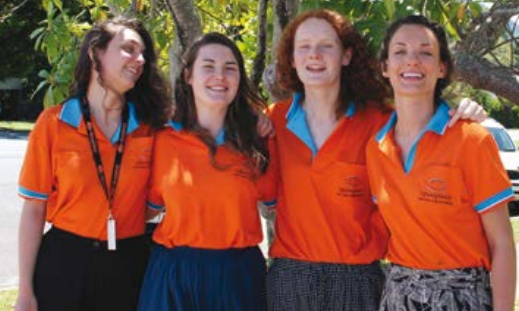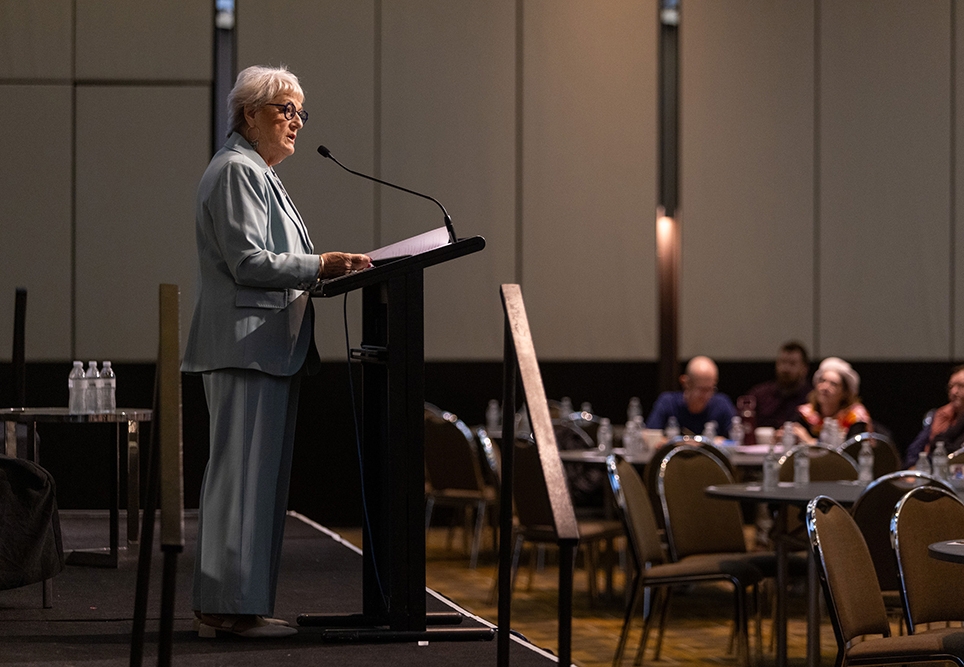It’s a long way from Dundee to the Cape, but for 5th year medical students from Dundee University Olivia Curran, Sarah Blue, Lauren Copeland and Ailsa Gelling, it was achieved in four steps of separation. Thanks to Lauren’s boyfriend’s aunt’s friend who knows Dr Jacki Mein, Senior Medical Officer with Apunipima Cape York Health Council, the four women were able to travel from Scotland to the north of Australia to achieve their aim to work with Indigenous people.
Travelling from wintry Scotland in December, they time spent in Sydney and Melbourne before heading to Apunipima’s Cairns office to undergo a week of induction and to get kitted out with the organisation’s distinctive orange shirts.
Lauren and Sarah headed to Napranum, a small Aboriginal community near the mining town of Weipa on Cape York, while Olivia and Ailsa spent time in the Cairns and Mossman Gorge. After two weeks the four switched places, completing their placement in mid-February.
During their time in Cairns, Olivia and Ailsa worked with a range of teams including Baby One Program team – a health worker-led pregnancy to 1000 days home visiting program, attended a Yarning Session involving narrative therapy (they now proudly display their watercolour paintings in their apartment) and assisted the electronic medical record team gather and update missing patient data.
“We also spent time trying (unsuccessfully) to create a cardiovascular risk score spreadsheet, learned about national Key Performance Indicators and spent time at Apunipima’s Mossman Gorge Primary Health Care Centre,” Olivia said.
Working in the Cairns office provided the students with a new appreciation of the administrative side of healthcare and gave them an insight into the complexities surrounding funding and the background work needed to support those out in community.
“We’ve been placed in rural locations in Scotland so were aware of some of the difficulty providing care in such settings,” Ailsa said.
“The Cape is a more extreme version of this and so the importance of making sure healthcare is realistic in its aims has been made clear to us.”
The challenges (and rewards) of providing health care in remote locations were made clear to Lauren and Sarah as they spent time in Napranum and Weipa.
During their fortnight in Napranum, Lauren and Sarah worked on transferring patient data into Apunipima’s electronic medical record (as fifth year students they were unable to work with clients), giving them an insight into the burden of disease within the community.
“It has been interesting to appreciate the impact of chronic disease on these communities and the influence of access to healthy food and equally, to alcohol and cigarettes etc. on these problems,” Sarah said. “Issues like the burden of type 2 diabetes, particularly in a younger population, has been illuminating and surprising and we think it is the comprehensive approach to tackling such problems that sets Apunipima apart.
“It’s been interesting working in a community where there are three health providers (Apunipima, Royal Flying Doctor Service and Queensland Health). Clearly there is still work to be done on Closing the Gap between Indigenous and non-Indigenous Australians and it would be naive to think that any system is perfect for achieving this,” she added. “However, we can honestly say we have had an excellent impression of the work currently being done.
“The staff we have met have all been fantastic and incredibly committed to their work which can clearly be challenging at times. However, the opportunity to provide care to such a diverse population with a unique culture and spiritual connection, is understandably very rewarding.
‘Seeing the mix of community-based and Fly In – Fly Out workers: it’s obvious that community health workers are vital for the work of those who fly in and fly out to be meaningful for the residents of the community.”
Along with their work, the women spent time meeting locals and visitors and participating in community activities.
“We’ve been introduced to fishing, bowls, squash, swam a lot in the pool, played social netball and ran a five km fun run on Australia Day,’ Lauren said.
“We’ve managed to meet the doctors and medical students working in Weipa who have been great at helping entertain us and get to places! Our biggest achievement has to be winning the trivia night at one of the local restaurants.”
The women have both been inspired by their time in the north and Lauren is now seriously considering working in remote health when she graduates.
“We both loved our time in Napranum/Weipa and would love further opportunities to spend time in Aboriginal communities,” said Sarah.
“Lauren has real plans to return to Australia and since being in the community, is seriously considering pursuing a post in a rural area sometime in the future. The idea of Indigenous medicine really appeals to me also; I’m just not sure I could cope with the heat and the constant application of sun cream given my ginger complexion!”



